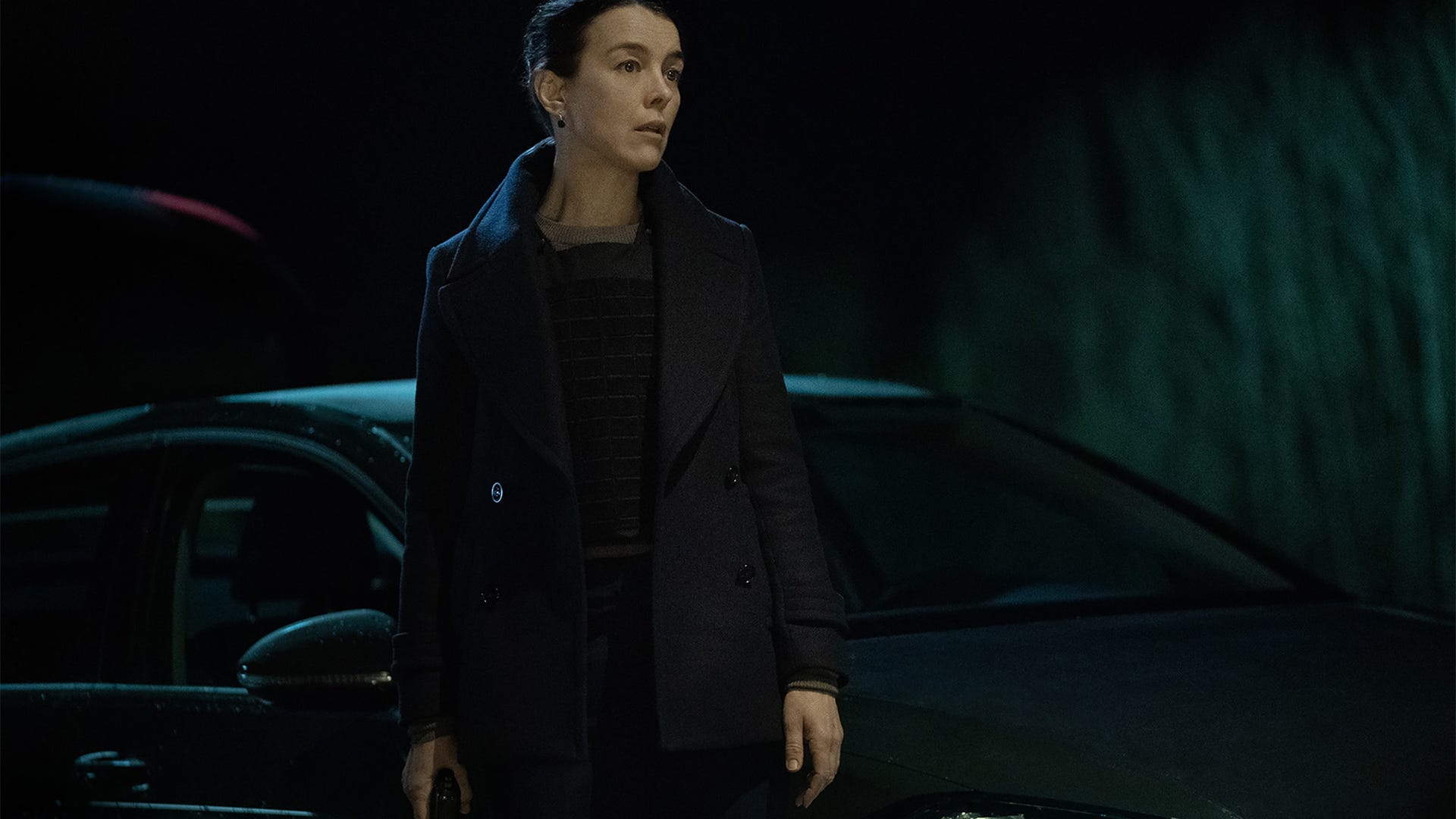Join or Sign In
Sign in to customize your TV listings
By joining TV Guide, you agree to our Terms of Use and acknowledge the data practices in our Privacy Policy.
Nominating Counterpart for an Emmy Would Make Its Cancellation Hurt a Bit Less
Emmy voters should take another look at the Starz drama and remember what originality looks like
Long ago I accepted that many of the shows I personally connect to will likely never be Emmy favorites, but that doesn't mean I've given up hope or the idea of campaigning for them. And in my opinion, no series deserves more awards attention right now than the dearly departed Starz drama Counterpart.
A science-fiction spy drama about parallel worlds connected by a secret crossing in Berlin, the show featured an existential multiverse narrative that followed two versions of the same person -- one from each world -- to explore the complexity of human nature and how our lives can be changed by our decisions and a slightly different set of circumstances. Based on that somewhat simplified description of the series, it might be kind of easy to understand why a cerebral show about identity might not have found as many viewers as, say, one that featured fire-breathing dragons or assassins with impeccable taste in fashion. But the series, created by Justin Marks, grounded its fairly high-concept espionage story with impressive character work brought to vivid life by actors like J.K. Simmons, Olivia Williams, Harry Lloyd, Nazanin Boniadi, and Sara Serraiocco, among others.
See More of TV Guide's 2019 Dream Emmy Nominees
Portraying multiple characters or different versions of the same character does not necessarily make one actor more worthy of recognition than another, but it does require a bit more work. And it also takes an impressive amount of skill to be able to do it well. To ensure that each version of the character feels distinct, actors must build them and develop them from the inside out. Some of that work has already been done for them by the show's writers -- and on a more obvious level, by a team of makeup artists, hair stylists, and costume designers -- but a lot of what we see on-screen is the work of the actor or actress in question. It's in the way they make subtle choices regarding the way they move or in the way they carry themselves in order to distinguish between the different versions of the character. It's in the way they deliver their lines or alter their speech patterns to make people feel like individuals. It's in the way they do nearly everything. And nowhere was this more clear than in Simmons' thoroughly engaging performance as two men who existed at opposite ends of a spectrum.

J.K. Simmons, Counterpart
StarzAs Howard Alpha (the name given to the version of Howard from "our" universe), Simmons was mild mannered and meek, a low-level bureaucrat who never asked too many questions and usually kept his head down. He was a loving husband with none of the skills to be involved in counter-intelligence. But as Howard Prime (the same person from the "other" universe), Simmons was a brash and confident spy who lied and manipulated others without a second's thought. He walked with purpose and wouldn't hesitate to pull the trigger, a point that he actually made at the end of Season 2 in order to highlight the ways in which he and Howard Alpha, who'd started to more closely resemble one another after living in each other's worlds for extended periods of time, were still different.
The TV Season's Saddest Cancellation Was Counterpart
And though the series was ultimately driven by Simmons and kept afloat via multiple excellent supporting performances from Lloyd, Boniadi, and Serraiocco, perhaps no one embodied the fractured soul of the Starz drama more in Season 2 than Williams' Emily. As Emily Alpha, who awoke from a coma in Season 1 but suffered memory loss, Williams was raw and vulnerable, a woman searching for her identity and the person she used to be. She understood who she was, and more importantly, she understood she was no longer that person. So she spent most of Season 2 trying to reconcile that woman with the woman she had become.
Because Counterpart was the story of dual worlds, though, Emily's determined other in the Prime World was also searching for the original Emily Alpha, because she held the answers she desperately sought. So, in all, there were three different versions of Emily that existed throughout Counterpart's overarching narrative, and in a show full of powerful performances, Williams' work stands out more than most. But it's not because of the way Williams' characters were radically different; rather, it's because they ultimately felt more similar than some of the other counterparts. Simmons is predictably excellent in everything he does, and as Howard he revealed his range and ability to captivate an audience. But the differences between his characters was obvious, and for most of the show, Williams' work required her to be more subtle in the ways she portrayed her characters, as the points of divergence were less flashy or clear.
Discover your new favorite show: Watch This Now!

Olivia Williams, Counterpart
StarzHistorically, genre series have struggled to break through at the Emmys -- the wild success of Game of Thrones over the last decade is the exception that proves the rule, as shows like Buffy the Vampire Slayer, Battlestar Galactica, and other similarly groundbreaking sci-fi and fantasy series regularly went ignored by the Academy. Counterpart was a genre show with the heart of a prestige drama. It had an ensemble cast that was just as impressive -- if not more so -- as any of the other series that voters have recently deemed worthy.
In its second season, the show deepened its already complex narrative as it further explored the depths of human nature and our ability to change while also providing viewers with some much-needed answers. It blended genres, and its ability to effortlessly bounce between intellectual and thrilling is what made it wholly unique, a true original at a time in which originality feels like it's on its last legs. As the number of TV shows continues to rise and viewers struggle to keep up with the growing number of possibilities, more and more networks are gravitating toward projects that come with a built-in audience in order to cut through the noise. And while this is great for networks, it is unfortunate for viewers who want to experience the excitement of something new. In a world where novelty is dying, Counterpart bravely created a new one that thrived on intrigue.
It took four seasons for Emmy voters to reward Tatiana Maslany and Orphan Black for doing something similarly unique. Counterpart doesn't have that kind of time since Starz canceled the series after two beautiful seasons earlier this year. This is it. This is the last time the TV Academy can recognize the truly outstanding work that set this show apart from the rest of the drama field. So before we all die from excessive boredom as a result of too many reboots and revivals, please take another look at Counterpart and the incredible work its cast did and try to remember what it is we can accomplish when we open our minds to the possibilities.
Emmy nominations will be announced Tuesday, July 16. The 71st Primetime Emmy Awards will be broadcast Sunday, Sept. 22 at 8 p.m. ET / 5 p.m. PT on Fox.
